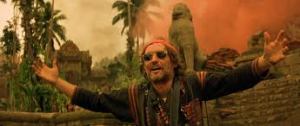Although I am a giant fan of great pop song craft, lately I have been listening to more dissonant fair like Public Image Ltd. and Rollins Band. Lately I have been listening to some jams that Rollins Band did with free jazz saxophonist Charles Gayle. Here is one called Miles Jam #2:
Now I completely understand that there are some people that will just not like this kind of stuff due to the dissonant nature of the music. I’m sure that there are even some of you out there that will think I can’t possibly enjoy this stuff, that I’m just claiming I like it to be different. But honestly, I find this kind of stuff beautiful. (And some of the insane language that Henry Rollins uses I find quite funny in the way that certain parts of Apocalypse Now are funny.) I feel like when musicians play, that they are creating small films. Music is really visual to me.
When you go to a movie theater I sometimes want to see different kinds of films. Sometimes you want to see something that tells a great story. Sometimes you want to see something that is more surreal and visual. Sometimes you want to see a comedy and sometimes a horror movie. Sometimes you want to hear a great three minute pop song and sometimes you want to hear almost thirteen minutes of dissonant metal jazz! Each kind of music creates different imagery in the imagination.
The only kind of music I don’t like is stuff that just creates vanilla imagery. There are a lot of modern country songs that are so bland I feel like my brain is being sucked out of my ears by a vacuum. There is a lot of pop that has been autotuned to where the singers voice has been drained of all personality. Those kinds of things leave my mind empty.
But really if you try to think of music as being visual, so much more of it will open up to you. Some people are painting beautiful landscapes with sound and some people are using dark surrealism. Imagine walking through an art gallery and each kind of music is a different period. Give it a try.

You must be logged in to post a comment.